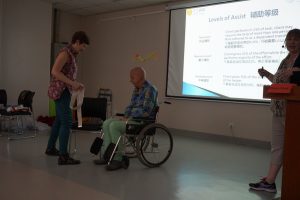5 Great Benefits of Rub for Inflammation and Minor Pain
Content Body: Whether you are an athlete or a regular office-goer, every human body is prone to two issues: inflammation & minor pains. Strained, overworked, and strained muscles these fundamental problems can be relieved by simple muscle rub cream. In most cases of minor aches, muscle rubs work by rushing blood to the affected areas. However, when the user is tackling inflammation, rubs can provide cooling, soothing sensations to ease it. The third primary work of muscle rubs is to penetrate herbs to encourage the healing of muscles. These rub creams are prepared to loosen up tight, loosen up and tired muscles so that they can perform at their full potential.
- Reducing Swelling & Inflammation
Cooling rubs, especially ones prepared using CBD oil, are the first choice of people facing inflammation-related skin issues. Meanwhile, warming muscle rubs are usually applied for the sole purpose of improving blood circulation in certain areas.
Rubs with cooling effects can also reduce swelling and inflammation caused to any muscle due to injury or overuse. It is the active ingredients like MCT oil, lavender, and menthol that make these cooling rubs so effective for inflammation.
Most of these rubs that are thick in the state can tackle acute pain, cramps, and scars as well. What makes such rubs ideal to use is the fact that they are suitable for all sorts of skin types, even for sensitive and dry.
- The Natural Rubs Are Good For Your Skin.
Along with helping you cool down the inflammation and helping you with pain, natural rub creams are actually good for your skin too. Natural rubs contain ingredients valuable ingredients like clary extract, willow bark, Tocopheryl Acetate (Vitamin E), Persea Gratissima (Avocado) Fruit Extract, Ascorbic Acid (Vitamin C), Saccharide Isomerate, and Tilia Cordata (Linden) Flower Extract.
All these ingredients help your body in reducing inflammation, pain, and stiffness. Similarly, some rubs have black pepper and ginger in them, that help in warming muscles, joints and tendons naturally.
The foremost benefit of using natural products is that you’re not applying lab-developed chemicals but only nature’s boons provided to humans. In other words, you’re lowering the risk of irritation, blistering, swelling, and other side effects.
Other side effects in rather basic creams include severe redness, nausea, ringing in the ears, rashes, dizziness, and allergic reaction. So, it is better if you’re consulting a proper doctor before using any rub available in the market. If your city is still observing lockdown, then telehealth is a safer option.
- Warming The Muscles/ Painkillers
The most basic combination every rub contains is cassia oil, camphor, and menthol. This master combination provides pain relief and vasodilation. Vasodilation is the process of drawing blood rush into the skin capillaries that create warmth sensation.
While using a rub for warming up a muscle, make sure it has basic ingredients cayenne, ginger, rosemary, and lemongrass. Named elements are essential to create a gentler sensation of warmth.
Many studies have found that many rubs are effective as acetaminophen and fast-acting as pain relief in the cases of acute tension headaches. So, if you have a home care consultant as him/her to throw those painkillers away and start using rubs straight away. Nonetheless, if you’re not using the services of a home care consultant, read here why you should for your business?
- Accelerates Healing Process
We’ve established how rub creams help to rush blood to a muscle it is applied to with ingredients like camphor. Health benefits of improved blood circulation include reduced inflammation and quicker healing time.
Some leading rub creams also have capsicum that blocks pain impulse transmitter nerve receptors. The whole process not only reduces the pain but also speeds up the healing process.
Capsicum is also used in medicine as it reduces the aches induced from gastrointestinal, arthritis, and even cancer.
Another basic ingredient that boosts the healing process is methyl salicylate that numbs the skin, reducing aches and stiffness.
- Unlocking Skin Cells
Your skin is the largest organ of your body. It regulates temperature, plays a vital role as a protective water barrier, controls fluid loss, and keeps your health balanced internally. There is an intricate blood supply that human skin is supported by. Our skin also has nerve endings that carry signals like pain, temperature, touch, etc., to the brain.
The rub creams we use carry medication through our skin layers directly into the blood. Certain compounds in the rubs help in penetrating skin barriers by widening the closed channels for a longer time.
Not just that, the rub creams also help the skin in absorbing drugs quickly through the unlocking of the skin cells closed naturally.
Ending Note
So, these are some expected benefits of the rub creams used basically to reduce inflammation and minor pain. The medical world is increasingly getting close to topical drugs instead of pills and injections. The reason behind this new trend is thought to be the fact that rub creams have lesser side effects than their counterparts. Rub creams are a safer option, especially for kids and senior citizens.
However, it is highly recommended that one use the natural rub creams as much as possible as they have lesser side effects.
CBD rubs are the most recommended rub creams as the cure for inflammation if your state has legalized it. They are safest, have all the required ingredients, and are very economical compared to other options.
Author Bio
For the past year, Sami J has worked as an author at Clariskincare.com. CLARI Skin Care is a growing company that is owned and operated by women and focuses on providing skincare beauty and body products. She has evolved a passion for content writing through beauty. Beauty and skincare are her main interests, which is what lead her to start writing within these industries.
Guest Blog: 5 Aged Care Aids that Should Be Accessible to Health Workers
When you are involved in the healthcare sector in Australia, and dealing with aged caregiving, you need to know what you may need to take care of the elderly under your supervision. Aged care requires some equipment and aids to be accessible to healthcare workers in order for them to perform their duties responsibly.
After all, health care workers dealing with aged caregiving is more demanding than many other jobs. You have to be on call for tending to the needs of the elderly in your care. If the equipment you have is insufficient, there might be a drop in the level of service provided.
That reflects badly, not only on you but on the health care facility as a whole. If you are missing any of these 5 aged care aids at your facility, you need to get in touch with your supervisors to have access to them when you need them most.
1. Wheelchairs
This is an absolute essential and can be used with many of the other aids mentioned here. There are many elderly that face difficulty when walking and a wheelchair on hand ensures that they don’t have to wait and suffer in discomfort to get to where they want.
It’s really important to have wheelchairs available on the spot if there is an injury in the elderly as the statistics about hip injuries and lack of immediate care are not that bright.
2. Gel Cushions
There are times when the elderly patient complains of pain in their hip joints and that sends stress signals, as your mind starts to go haywire thinking of the implications. You don’t need to be worried. With gel cushions, you’ll be able to have support for the elderly when they sit down.
The gel cushions are especially formulated for multiple uses, and are recommended by physiotherapists for pressure problems that may lead to stress fractures down the road.
3. Arthritis Handles
If there are elderly in your aged care facility that you see, struggling to open doors due to arthritis, an arthritis handle can help them be more mobile with less effort. It can safely attach to doors and drawers to help open them easily.
There’s no need to twist any knobs, grip firmly or any of the hard stuff. The elderly can get a hold of the things most important for them with an arthritis handle installed on doors and cupboards.
4. Hip Protection Pants
Safety+Mobility Aged Care Suppliers also have unisex protection pants with padded pressure guards, especially near the hip, for the elderly. It can be worn over undergarments as well, if they feel uncomfortable wearing it without underpants.
It’s not embarrassing as it is barely visible to anyone and protects the most precious areas of the elderly’s lower torso when they sit and walk. It’s a necessary aged care aid for those prone to hip problems.
5. Back Support
Lastly, back support is also very important because as we age, our bones also start to weaken without the proper diet and exercise. It means that you need to have our most important body areas safeguarded as we approach our golden years. A cushion provides the back and head support to help the elderly with posture problems.
Caregiver Stress: Tackling Tough Decisions In the Age of COVID
Caring for and making decisions for an aging and sick parent is never easy. But as the coronavirus continues to complicate matters for older adults, it can be even more challenging to know how and when to step in. However, sometimes choices must be made, and when that time comes, it pays to be prepared. Senior Care Central explains what you need to consider.
How Does the Virus Affect Seniors?
Scientists and doctors have made inroads in pandemic research, and all are resolute in reporting that older adults are in the highest risk category. As Johns Hopkins explains, those over age 60 with pre-existing conditions, such as lung disease and diabetes, are at the greatest risk. For these reasons, if you are caring for a senior with a health condition, the decisions you make now are that much more important to their overall health and well-being.
Getting It Together
Even if you’ve already discussed your senior loved one’s wants and wishes, you may not be legally able to make decisions if they take a turn for the worse unless you have legal documents in place. Elder Protection Center lists the most pertinent of these as a medical directive, power of attorney for health care, power of attorney for finances, revocable trust, and a will.
Each of these documents allows you to give direction in different areas. For example, the healthcare power of attorney lets you quickly make decisions about things like medical treatment in case your loved one is incapacitated. Becoming appointed as the executor of a will gives you the power to carry out their final wishes as far as their estate and belongings go. Making arrangements while your loved one is able ensures their wishes are met.
Hospice Care
As your loved one declines, it may be necessary to arrange for hospice care. If your loved one’s illness worsens and they cannot take care of themselves and they need assistance maintaining a medical condition or hands-on care when it comes to bathing, dressing, and eating, it’s likely time for hospice care to take over. You might even be attempting this care yourself, but find yourself in a burnout situation, in which case a professional is the best choice for you both.
Financing the Future
If your loved ones’ needs outweigh their ability to continue in their current living situation, it might be necessary to sell their home to cover expenses. Keep in mind, however, that the real estate market has changed in response to COVID-19.
First, find out what you can earn from the sale of the home by running some calculations online. It’s also a good idea to learn about your local market to help with your decisions. You can get a better idea of what their home might sell for by doing some research on market trends in the area. If their property value has dropped dramatically, it may be wise to wait and use other means to pay for expenses until the market perks back up.
For instance, you could rent out the property to generate income to cover your loved one’s living expenses. Just bear in mind that by turning the home into a rental, you or your loved one will be responsible for tenant vetting, maintenance and upkeep. You’ll also need to gauge the cost of local rentals. Denver apartment rentals right now are averaging $1,874 for a one-bedroom. If this seems like an ideal scenario, you can also work with a property manager to handle rental operations for a small percentage.
Key Takeaways
- The coronavirus affects senior citizens, and that can make it more difficult for caregivers to make decisions about their well-being.
- Without having legal documents in place, any decisions you do make may not be carried out.
- Real estate prices may affect your loved one’s ability to pay for care, and research may be needed when facing a home sale.
Again, it’s not easy to make decisions for a loved one, particularly one who has a life-limiting illness and may not be able to offer input. But as a caretaker, making decisions is something that you have to do. As the world continues to remain uncertain, having a plan in place now can save you and your entire family from indecision and heartache during what is surely one of the most stressful times of your life.



